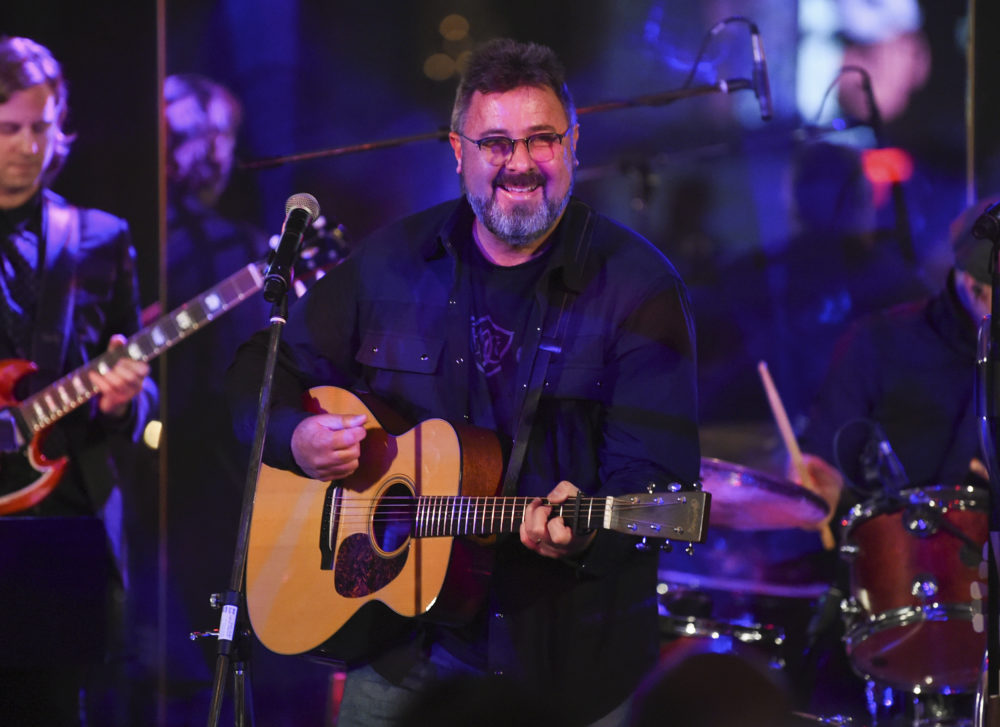Advertisement
Country Star Vince Gill Digs Deep For New Album 'Okie'
Resume
Country music star Vince Gill had his first No. 1 hit with “I Still Believe In You” back in 1992.
He’s had many more since then, and won 21 Grammys, sold over 26 million albums and was inducted into the Country Music Hall of Fame in 2007. Gill even had stints with the Eagles and Pure Prairie League.
So why he is so humble? It could be his respect for fellow country greats, Merle Haggard and Guy Clark. It could be the influence of his wife, musician Amy Grant, or his mom.
Gill writes about all of them on his new deeply personal album, “Okie.”
“It's just a reflection of a lot of life lived,” Gill says of the record. “It's time to be a little bit reflective and maybe talk about a perspective of a life with this many years attached to it.”
Interview Highlights
On the song “A Letter To My Mama”
“She's 93 years old and still around, and I thought she deserved a song. This song is really old. It's about 18 years old and [I] rediscovered it in a desk drawer, and thought, 'Oh, this might fit this new record.' ”
On the song “What Choice Will You Make” about a teenage pregnancy
“What's beautiful about this song is that it doesn't judge. It doesn't say what you should or shouldn't do, and it never really leaves that moment either, which I think is really neat about the song.”
On the song, “Forever Changed,” where Gill speaks directly to sexual abusers
“Just empathy for people that have been acted upon. When I was a young kid, I was in seventh grade and playing on the basketball team at school, and the basketball coach tried to act on me. And you know, in seventh grade nobody knows anything about what the heck's going on, and here's somebody you look up to and you think is the greatest thing in the whole world. And I just jumped up and ran as he put his hand further up my leg. I said, 'There's something wrong here,' and I ran, and so I was lucky. I did not get abused, but I sure could have been, and I think it gave me, perhaps, a place to come from in maybe the telling of a story like this.
“Some people can suppress and be OK. Some people can't. It's not one way. So if there's somebody that's kind of a voice for them and sticking up for them and being kind to them, I think it goes a long way.”
On writing songs about his wife, Amy Grant
“She's easily the most welcoming, nonjudgmental, kindest soul I've ever come across. It's remarkable to watch her just kind of react to life and the people in it, and when they come into your life and how she treats them. In that other song, 'The Red Words,' it's a comparison of her. She reminds me of of those red words [in the Bible] because of the nonjudgment and the welcoming of all people, all races, all sexualities, all things, you know, sometimes that that world of evangelicals can't embrace. She does, and it's beautiful to stand behind her and watch it.”
On the country greats that have influenced him
“I don't think I'd ever with a straight face feel like I've achieved their level of greatness. And it's unfortunate that so many of my heroes are passing on, and maybe when they're all gone, I might finally welcome that role of the elder statesman. And I do anyway, you know, with young kids that I've had an impact on them and wanting to learn to play and sing and write songs and stuff, so I get it. But I just have such tremendous reverence for my heroes. And like in the songs about Guy and about Merle ... I try to grieve a lot of times through songs, in losing people that I love. And talking earlier about people that are abused, it's hurt. It hurts you. So yeah, some of that's coming from a grieving kind of place and trying to tell stories about what moves me. Music has always, to me, been about being moved more than being impressed. In the way that I try to write and play and sing, I want to a listener to be moved much more than I want them to be impressed.”
Emiko Tamagawa produced and edited this interview for broadcast with Todd Mundt. Samantha Raphelson adapted it for the web.
This segment aired on August 14, 2019.


